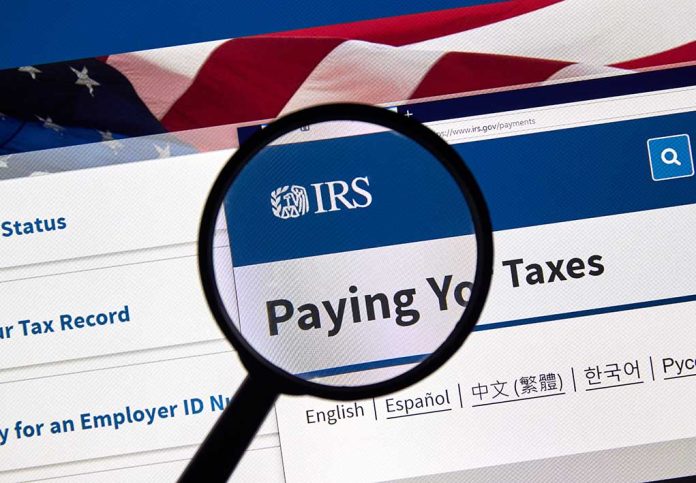
The Supreme Court strengthens IRS power as it rules 8-1 that the tax agency can keep funds paid by a bankrupt company, even when those payments were deemed fraudulent under state law.
Key Takeaways
- The Supreme Court ruled 8-1 that the IRS’s sovereign immunity trumps bankruptcy code provisions regarding fraudulent transfer recovery.
- Justice Ketanji Brown Jackson wrote the majority opinion, while Justice Neil Gorsuch issued the lone dissent.
- The ruling prevents bankruptcy trustees from recovering payments made to the IRS beyond the standard two-year lookback period.
- The case involved a $145,000 transfer made to the IRS by All Resort Group Inc. three years before bankruptcy.
- The decision clarifies that sovereign immunity waivers are jurisdictional and don’t create new substantive rights against the government.
Supreme Court Protects IRS From Bankruptcy “Clawbacks”
In a significant victory for federal tax authorities, the U.S. Supreme Court ruled that bankruptcy trustees cannot reclaim payments made to the IRS that might otherwise be considered fraudulent transfers under state law. The 8-1 decision in United States v. Miller, authored by Justice Ketanji Brown Jackson, overturned a Tenth Circuit ruling and established that the government’s sovereign immunity shields it from certain bankruptcy claims, particularly those seeking to recover payments made more than two years before a bankruptcy filing.
The case centered on a $145,000 payment made by Utah-based All Resort Group Inc. to the IRS three years before the company filed for bankruptcy. The payment covered personal tax liabilities of the company’s principals rather than corporate obligations. After the company’s bankruptcy filing, the trustee sought to recover these funds, arguing they constituted a fraudulent transfer under Utah state law when incorporated into federal bankruptcy proceedings.
🚨 SCOTUS Just Gave the IRS a Free Pass to Keep Stolen Money~Even if It Came from You 🚨
The Supreme Court just ruled on 26 March, 2025~8-1 in United States v. Miller that if someone steals money from you or your business and uses it to pay their IRS tax debt, the IRS gets to… pic.twitter.com/D6Wg5HxtfI
— 💅🏻💋qubit💋💅🏻#FlynnFramedTrump‼️ (@qubitTwit) March 27, 2025
Sovereign Immunity Takes Center Stage
The Supreme Court’s decision hinged on technical but significant distinctions regarding sovereign immunity waivers in the Bankruptcy Code. While Section 106(a) of the Code does waive the government’s immunity for certain bankruptcy proceedings, the Court ruled this waiver doesn’t extend to the underlying state law claims that might be incorporated into federal bankruptcy actions. This interpretation effectively limits the tools available to bankruptcy trustees when attempting to recover funds from government entities. “Waivers of sovereign immunity are jurisdictional provisions that empower courts to hear claims against the government but do not themselves typically create any new substantive rights against the government,” wrote Justice Jackson in the majority opinion.
The ruling resolved a split among federal appeals courts, with the Supreme Court rejecting approaches taken by the Fourth, Ninth, and Tenth Circuits in favor of the more restrictive view previously adopted by the Seventh Circuit. The decision significantly limits the ability of bankruptcy trustees to use state fraudulent transfer laws to recover payments made to the IRS beyond the two-year standard lookback period established in federal bankruptcy law.
Implications for Bankruptcy Proceedings
The Court’s decision carries significant ramifications for bankruptcy proceedings involving government entities. By limiting the ability to claw back funds paid to the IRS beyond the two-year lookback period, the ruling effectively provides greater protection to tax payments. Bankruptcy experts note that while this particular avenue of recovery has been closed, trustees might still pursue certain claims against the government under different sections of the Bankruptcy Code that explicitly waive sovereign immunity.
Justice Neil Gorsuch stood alone in dissent, suggesting a different interpretation of the bankruptcy statutes and their interaction with sovereign immunity principles. The ruling underscores the Court’s traditional narrow construction of sovereign immunity waivers, consistently resolving ambiguities in favor of the government. For taxpayers and bankruptcy practitioners, the decision reinforces the formidable protection enjoyed by the IRS when collecting tax payments, even in cases where those payments might otherwise be deemed improper under state fraudulent transfer laws.
Sources:
Supreme Court Hands IRS Win Over Bankruptcy Trustee Clawback (3)
Supreme Court Reverses Bankruptcy Tax Clawback Decision
SCOTUS Sides With IRS In Bankruptcy Dispute







